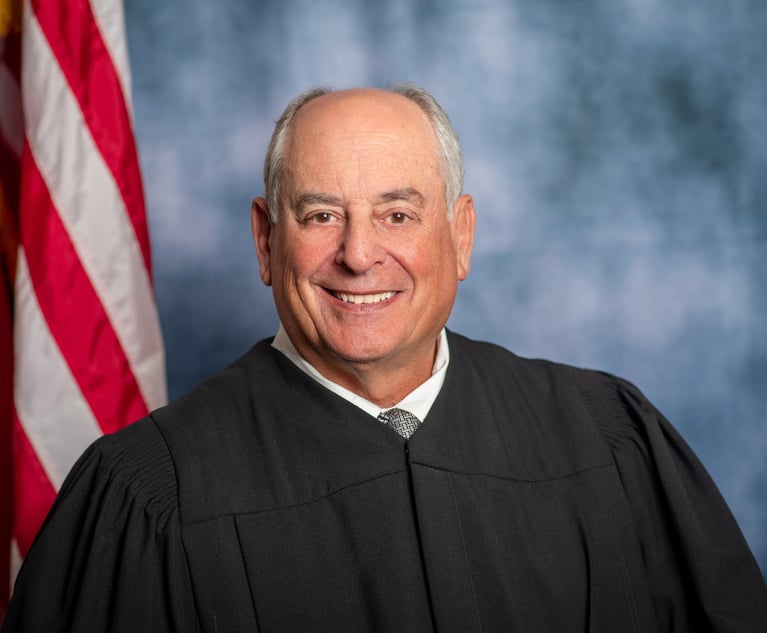 Georgia Chief Justice Harold Melton (Photo: John Disney/ALM)
Georgia Chief Justice Harold Melton (Photo: John Disney/ALM)Scooby-Doo Warms Up Chat With Chief Justice
Supreme Court Chief Justice Harold Melton talked to a writer from the University of Georgia magazine about his law school days, his first job with the AG, early thoughts on criminal justice reform—and how Scooby-Doo came to be his screen saver.
March 07, 2019 at 03:19 PM
3 minute read
Cartoon characters saved the day in a story about Georgia Supreme Court Chief Justice Harold Melton published in the current issue of the University of Georgia magazine.
“Walking into the office of the Supreme Court of Georgia's chief justice, with its wood-paneled walls and marble nameplate, you feel a sense of awe and perhaps a bit out-of-place in your blue jeans,” writer Leigh Beeson began. “Then you see Shaggy, Velma, and Scooby-Doo as the background of the chief justice's computer, and you know he doesn't take himself too seriously.”
Beeson went on to paint a vivid portrait of the chief. He described the value of his preparation at the University of Georgia School of Law. “I joke that I was in the top of the middle of the class, but I really do feel like they prepared me on the knowledge of the law and the exposure to the culture of the legal community, which is just as important,” he said.
He remembered his first job after graduating from law school, working for Attorney General Mike Bowers. He started off in property tax law at a time when the government was reassessing values.
“We were going across the state making sure counties updated their values, and then the local communities were howling because the values had gone up,” he says. “So I got to walk into these remote counties throughout the state and say, 'Hi, I'm from Atlanta. I'm the guy that's trying to make your tax base go up,'” he recalled.
He revealed insight into the beginning of the criminal justice reform movement before Gov. Nathan Deal took the top office, back when Melton was executive counsel to Gov. Sonny Perdue.
“If we kept up with those incarceration rates, we would probably have to build one prison per year or close to it,” Melton said. “It just wasn't sustainable. And we also realized that, when you incarcerate somebody, that has an impact on the person, but it also has an impact on the families, the household that person came from.”
The treatment courts that spread across the state during Deal's eight years in office turned the trend around, with the number of prisoners—and the prison budget—dropping instead of increasing. Melton said in his state of the judiciary speech this month that he wants to take the movement a step further and begin interventions in schools to keep young people on track early in life.
Before she left, Beeson solved the mystery of the colorful screen saver.
“As for the case of the Scooby-Doo backdrop, his 18-year-old daughter was found guilty,” Beeson wrote.
She ended with this.
“I took my new computer home,” Melton laughed. “Within two minutes she had Scooby on there.”
In addition to the Spring 2019 printed issue, the article can be found online at news.uga.edu UGA Today.
This content has been archived. It is available through our partners, LexisNexis® and Bloomberg Law.
To view this content, please continue to their sites.
Not a Lexis Subscriber?
Subscribe Now
Not a Bloomberg Law Subscriber?
Subscribe Now
NOT FOR REPRINT
© 2024 ALM Global, LLC, All Rights Reserved. Request academic re-use from www.copyright.com. All other uses, submit a request to [email protected]. For more information visit Asset & Logo Licensing.
You Might Like
View All
Georgia Supreme Court Honoring Troutman Pepper Partner, Former Chief Justice
2 minute read
'A 58-Year-Old Engine That Needs an Overhaul': Judge Wants Traffic Law Amended
3 minute read
Appeals Court Removes Fulton DA From Georgia Election Case Against Trump, Others
6 minute read
Family of 'Cop City' Activist Killed by Ga. Troopers Files Federal Lawsuit
5 minute readTrending Stories
- 1Censorship or Security Measure? TikTok Ban Pits Civil Liberties Groups Against US Officials
- 2Chancery Claims Linking Fox Management to Defamation Liability Clear Hurdle
- 3NJ Managing Partner Survey Indicates Tougher 2024 for Many Law Firms
- 4Southwest Airlines Faces $100M Class Action Over Pay Periods
- 5Firms Saw Slight Declines From Last Year, but Merger Interest Remains High, Managing Partner Survey Reveals
Who Got The Work
Michael G. Bongiorno, Andrew Scott Dulberg and Elizabeth E. Driscoll from Wilmer Cutler Pickering Hale and Dorr have stepped in to represent Symbotic Inc., an A.I.-enabled technology platform that focuses on increasing supply chain efficiency, and other defendants in a pending shareholder derivative lawsuit. The case, filed Oct. 2 in Massachusetts District Court by the Brown Law Firm on behalf of Stephen Austen, accuses certain officers and directors of misleading investors in regard to Symbotic's potential for margin growth by failing to disclose that the company was not equipped to timely deploy its systems or manage expenses through project delays. The case, assigned to U.S. District Judge Nathaniel M. Gorton, is 1:24-cv-12522, Austen v. Cohen et al.
Who Got The Work
Edmund Polubinski and Marie Killmond of Davis Polk & Wardwell have entered appearances for data platform software development company MongoDB and other defendants in a pending shareholder derivative lawsuit. The action, filed Oct. 7 in New York Southern District Court by the Brown Law Firm, accuses the company's directors and/or officers of falsely expressing confidence in the company’s restructuring of its sales incentive plan and downplaying the severity of decreases in its upfront commitments. The case is 1:24-cv-07594, Roy v. Ittycheria et al.
Who Got The Work
Amy O. Bruchs and Kurt F. Ellison of Michael Best & Friedrich have entered appearances for Epic Systems Corp. in a pending employment discrimination lawsuit. The suit was filed Sept. 7 in Wisconsin Western District Court by Levine Eisberner LLC and Siri & Glimstad on behalf of a project manager who claims that he was wrongfully terminated after applying for a religious exemption to the defendant's COVID-19 vaccine mandate. The case, assigned to U.S. Magistrate Judge Anita Marie Boor, is 3:24-cv-00630, Secker, Nathan v. Epic Systems Corporation.
Who Got The Work
David X. Sullivan, Thomas J. Finn and Gregory A. Hall from McCarter & English have entered appearances for Sunrun Installation Services in a pending civil rights lawsuit. The complaint was filed Sept. 4 in Connecticut District Court by attorney Robert M. Berke on behalf of former employee George Edward Steins, who was arrested and charged with employing an unregistered home improvement salesperson. The complaint alleges that had Sunrun informed the Connecticut Department of Consumer Protection that the plaintiff's employment had ended in 2017 and that he no longer held Sunrun's home improvement contractor license, he would not have been hit with charges, which were dismissed in May 2024. The case, assigned to U.S. District Judge Jeffrey A. Meyer, is 3:24-cv-01423, Steins v. Sunrun, Inc. et al.
Who Got The Work
Greenberg Traurig shareholder Joshua L. Raskin has entered an appearance for boohoo.com UK Ltd. in a pending patent infringement lawsuit. The suit, filed Sept. 3 in Texas Eastern District Court by Rozier Hardt McDonough on behalf of Alto Dynamics, asserts five patents related to an online shopping platform. The case, assigned to U.S. District Judge Rodney Gilstrap, is 2:24-cv-00719, Alto Dynamics, LLC v. boohoo.com UK Limited.
Featured Firms
Law Offices of Gary Martin Hays & Associates, P.C.
(470) 294-1674
Law Offices of Mark E. Salomone
(857) 444-6468
Smith & Hassler
(713) 739-1250






